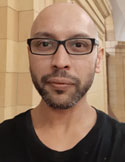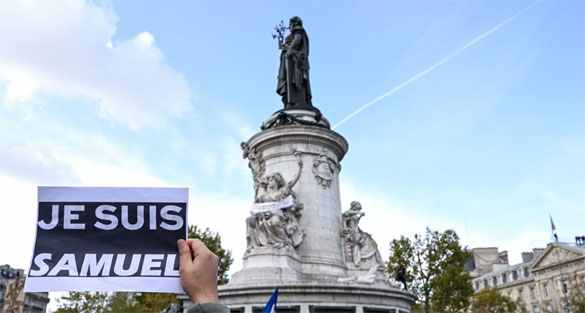
By Junaid Jahangir, New Age Islam
20 October 2020
The news of a French schoolteacher who was mercilessly beheaded for showing pictures of the Prophet to his students recently made media headlines. The analysis-based responses are varied to this incident, though I hope everyone would condemn this dastardly act without any ifs and buts. Put simply there is no provocation or justification for such a heinous act of murder.

Demonstrators like the one shown here carried "I am Samuel" signs as they gathered on Place de la République in Paris on Sunday to pay tribute to slain history teacher Samuel Paty. Similar gatherings took place in several other cities as France reels from the attack.
Bertrand Guay/AFP via Getty Images
-----
Some may argue that the news of the murder of a French teacher makes waves and Islam is put under trial but the mob lynching of Muslims in India, the detention of Uighur Muslims in Xinjiang, the persecution of the Rohingya Muslims in Myanmar, and the suffering of the Palestinians go unaddressed.
However, by the same whataboutism technique, the persecution of Ahmadis in Pakistan and those of Bahais in Iran that go unchecked can also be raised. Likewise, the case of Junaid Hafeez, who remains in solitary confinement in Pakistan, can be highlighted. Similarly, the case of Aasia Bibi stands out, whose whereabouts in Canada cannot be revealed due to threats to her life based on blasphemy allegations.
<
All of this means that to retain focus, instead of deflection to other issues, we should concentrate on the French context in light of the recent incident, which is the latest in a series of horrific incidents including Charlie Hebdo in France.
On the one hand, is the insistence on freedom of expression, which Muslims can and should support for it has been part of Muslim culture through time. In terms of depicting the Prophet, Muslim art is a treasure trove containing paintings of the Prophet made by Muslims in the past. One only has to do a simple google search and all such images become accessible. Additionally, the Shia Muslim position remains that images of the Prophet especially those before Prophethood can be respectfully made.
Apart from pictures of the Prophet, in terms of written prose or poetry, Muslim values allow for free expression with due respect. For instance, the 8th-century jurist Abu Hanifa stated that even if an utterance is made up of 99 percent of disbelief, it would still not amount to disbelief. Likewise, the 9th-century scholar Al Razi, among others, were free to critique Prophets. There is also literature that depicts the Prophet admonishing 12th-century Muslim scholar al-Ghazali for rebuking Moses. Even today, there stands an Urdu proverb that goes Likhay Musa Parhay Khuda (only God can read the writings of Moses), which refers to bad handwriting. There is also Muslim literature from Rumi that caricatures the clergy and their long beards. Indeed, Rumi’s poem ‘Moses and the Shepherd’ remains a timeless classic.
To continue with this line of thought, while a vast majority of Muslims argue against taking the law into one’s own hands, some also argue that there exists no Qur'anic verse that prescribes the capital penalty for blasphemy. They have marshalled around two dozen Qur'anic verses to bolster their case. Pakistan-based Islamic scholar Dr. Khalid Zaheer states that the Qur'an simply asks Muslims to be patient and to ignore those who insult and ridicule the Prophet.

Girls light candles on Saturday outside the school where a slain history teacher worked in Conflans-Sainte-Honorine, northwest of Paris. French President Emmanuel Macron denounced what he called an 'Islamist terrorist attack' against the teacher, who was decapitated on Friday, urging the country to unite against extremism. (Michel Euler/The Associated Press)
------
However, apart from freedom of expression, the issue of crude racism and Islamophobia in France also stands out. If young Muslim men and women face discrimination and prejudice in society, it certainly is not conducive to harmonious living. This contempt for the other is reflected when some observed how Charlie Hebdo captioned the pictures/drawings of three-year-old Aylan Kurdi with deep insensitivity and racism. That depiction emerged in a context where Muslim women who believe in wearing the headscarf were denied their right to do so. While, many religious scholars like Javed Ahmad Ghamidi, Moiz Amjad, Shehzad Saleem, and Khalid Zaheer argue that the headscarf is not an obligation, it is also true that the state has no right in policing the dress code of women. For France to dictate the removal of the headscarf is the equivalent of Iran or Saudi Arabia enforcing it. Whatever happened to freedom of choice that is supported by both secular and Islamic values?
We live in a time of short sound bites and angry outbursts, where people are less interested in listening to one another and more in foisting their adopted world view. It seems hearts have hardened and there is a clash of rigid worldviews. It is easy to shout slogans of liberty and freedom on the one hand or against racism and Islamophobia on the other hand. But to what end? Where does all of this take us?
The need of the hour is for people to look within. The French government will have to address what gives rise to racism and Islamophobia. They will have to carefully look at the message that is being sent out to their own Muslim citizens. The French President must take into confidence French Imams like Tareg Oubrou and listen to the voices of everyday French Muslims who are honest tax paying citizens of the Republic. Instead of pitting the state against them, he will have to show them that the state cares.
On their part, Muslims will have to look within to ask why some Muslims are preaching antiquated fiqh (jurisprudential) laws, developed in the age of Muslim empires, today. They will have to ask why rigid Muslim opinions on blasphemy and apostasy are being privileged over the more liberating ones, both of which emerge from the vast and diverse Muslim tradition.
However, if the French continue with their existing state policies and Muslims continue to let antiquated viewpoints go unchallenged, there will emerge no winners from such a clash of positions. Defensiveness must give way to dialogue.
In essence, the false binary of secular versus Islamic needs to be broken.
----
Junaid Jahangir is an Assistant Professor of Economics at MacEwan University. He is the co-author of Islamic Law and Muslim Same-Sex Unions. With Dr. Hussein Abdullatif, a paediatric endocrinologist in Alabama, he has co-authored several academic papers on the issue of same-sex unions in Islam.
New Age Islam, Islam Online, Islamic Website, African Muslim News, Arab World News, South Asia News, Indian Muslim News, World Muslim News, Women in Islam, Islamic Feminism, Arab Women, Women In Arab, Islamophobia in America, Muslim Women in West, Islam Women and Feminism




 Moderate Islamist here
Moderate Islamist here


0 comments:
Post a Comment